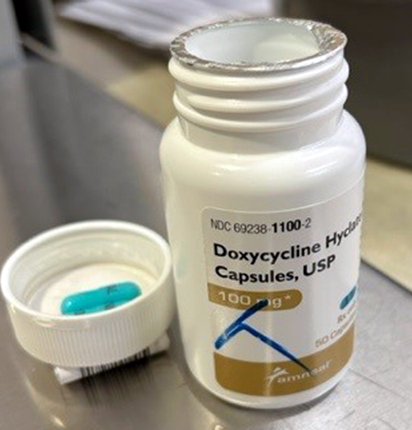

'Morning-after' pill recommended to reduce spread of STIs
A common antibiotic is poised to become a “morning-after” pill to reduce the spread of chlamydia, syphilis and gonorrhea among populations at higher risk for contracting those bacterial infections.
The Centers for Disease Control and Prevention (CDC) last week issued a preliminary recommendation for doxycycline to be prescribed to members of two groups — trans women and men who have sex with men — who also have experienced at least one sexually transmitted infection (STI) in the previous year and who are at ongoing risk to acquire an STI.
Preventive doxycycline is “the best new intervention that's been identified for STI prevention for quite a long time,” said Dr. Connie Celum, professor of medicine (Allergy and Infectious Diseases) and global health. “Every year for the last six or seven years, there's been an increase in bacterial STIs in the U.S. So, the current approach of testing and treating is just not enough.”
Celum co-led one of three studies whose findings motivated the CDC’s recommendation for “doxy-PEP” — shorthand for doxycycline post-exposure prophylaxis. In 2022, that study was ended early because the single test dose of 200 milligrams of doxycycline, taken within three days of unprotected sex, was highly effective at preventing the three STIs named above.
Across the three studies involving trans women and men who have sex with men, there was roughly a two-thirds’ reduction in chlamydia, gonorrhea and early syphilis infections, compared with control-group participants who didn’t get doxy-PEP. The highest reduction was seen in chlamydia and early syphilis infections, Celum said.
Moreover, adherence to doxy-PEP was high in the trials involving men who have sex with men: For example, in the doxy-PEP study in San Francisco and Seattle, about 85% of participants said they always or almost always took doxy-PEP after condomless sex.
Although doxy-PEP could be effective at reducing STIs in other populations, the CDC’s recommendation is purposely narrow, applying only to members of the groups involved in the recent research, she said. A recent study of doxy-PEP in Kenyan cisgender women did not find a reduction in STIs, apparently due to low adherence to the test drug regimen; a random subset of participants whose hair samples were tested showed a low proportion had doxycycline in their system.
“The idea of doxy-PEP is to do a targeted intervention for those whose burden of infection is the highest and the risk of future infections is the highest. If you can reduce their infection rate, they will be less likely to become infected with an STI, need fewer antibiotics to treat it, and less likely to spread it.” Celum said.
In its recommendation, the CDC acknowledged the concern that long-term, intermittent use of doxycycline might contribute to population-level antimicrobial resistance, as well as affecting the gut microbiomes of people who take the drug.
“It's an appropriate question,” Celum said. “We're trying to balance competing concerns. The studies suggested only a minor uptick in resistance in gonorrhea and Staph aureus, among those who were colonized with Staph aureus. But those studies followed participants for about nine months, on average, and we definitely need to monitor whether resistance levels increase farther out.
“A lot will have to do with how many people really use this. Again, I think we're trying to be thoughtful about reaching populations who will obtain the greatest benefit and for whom the benefits outweigh potential risks. Collecting additional data will be really helpful to try to answer these questions.”
The CDC is accepting public comment on its recommendation until Nov. 16.